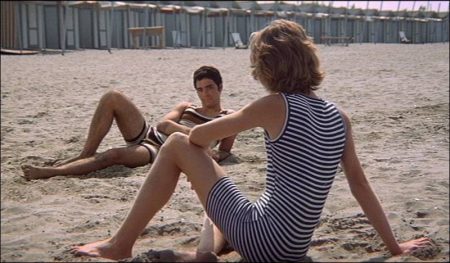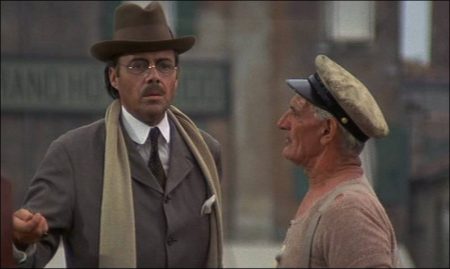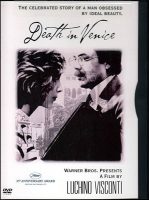Taglines: The celebrated story of a man obsessed with ideal beauty.
Death in Venice movie storyline. It’s the early twentieth century. Gustav von Aschenbach (Sir Dirk Bogarde), once married with a daughter, is a Munich-based composer of experimental music. Now a frail middle-aged man in ill health, he is advised by his doctor to get complete rest. As such, he is alone at the Grand Hotel, on the Lido in Venice, to convalesce.
He and his friend Alfred (Mark Burns) have had many a philosophical discussion about the concept of beauty, not only as it applies to his oft not appreciated music, but as it applies to the arts and life in general. It is in Gustav’s belief in how the nature of beauty can dominate one on a scientific as opposed to emotional level that he becomes obsessed with a Polish teenager named Tadzio (Björn Andrésen), who looks to be staying at the hotel with his sisters and their mother. Most of Gustav’s interactions with Tadzio are furtive yet still intense gazes from afar.
As time progresses, Gustav admits to himself that that obsession turns into love, with nary a word spoken between the two of them. On an emotional level, he is torn by his feelings, he at first trying to escape physically, then changing to doing anything to remain within view of Tadzio. What happens between Gustav and Tadzio may be dictated by issues external to them.
Death in Venice (original Italian title: Morte a Venezia) is a 1971 Italian-French drama film directed in Panavision and Technicolor by Luchino Visconti and starring Dirk Bogarde, Romolo Valli, Mark Burns, Nora Ricci, Franco Fabrizi, Marisa Berenson, Carole André, Björn Andrésen, Silvana Mangano, Leslie French, Antonio Appicella. It is based on the novella Death in Venice by the German author Thomas Mann, first published in 1912 as Der Tod in Venedig.
Behind the Scenes
In the second volume of his autobiography, Snakes and Ladders, Bogarde recounts how the film crew created his character’s deathly white skin for the final scenes of the film, just as he dies. The makeup department tried various face paints and creams, none of which were satisfactory, as they smeared.
When a suitable cream was found and the scenes were shot, Bogarde recalls that his face began to burn terribly. The tube of cream was found and written on the side was “Keep away from eyes and skin”: the director had ignored this and had been testing it out, as small patches, on various members of the film crew, before finally having it applied to Bogarde’s face.
In another volume of his memoirs, An Orderly Man, Dirk Bogarde relates that, after the finished film was screened for them by Visconti in Los Angeles, the Warner Bros. executives wanted to write off the project, fearing it would be banned in the United States for obscenity because of its subject matter. They eventually relented when a gala premiere of Death in Venice was organized in London, with Elizabeth II and Princess Anne attending, to gather funds for the sinking Italian city.
In 2003, Björn Andrésen gave an interview to The Guardian in which he expressed his dislike of the fame Death in Venice brought him and how he sought to distance himself from the objectifying image he acquired from playing Tadzio. He stated that he now disapproves of the film’s subject matter: “Adult love for adolescents is something that I am against in principle. Emotionally perhaps, and intellectually, I am disturbed by it – because I have some insight into what this kind of love is about.”
He also recounted attending the film’s premiere at the Cannes Film Festival: “I was just 16 and Visconti and the team took me to a gay nightclub. Almost all the crew were gay. The waiters at the club made me feel very uncomfortable. They looked at me uncompromisingly as if I was a nice meaty dish…it was the first of many such encounters.”
Death in Venice (1971)
Directed by: Luchino Visconti
Starring: Dirk Bogarde, Romolo Valli, Mark Burns, Nora Ricci, Franco Fabrizi, Marisa Berenson, Carole André, Björn Andrésen, Silvana Mangano, Leslie French, Antonio Appicella
Screenplay by: Luchino Visconti, Nicola Badalucco
Cinematography by: Pasqualino De Santis
Film Editing by: Ruggero Mastroianni
Costume Design by: Piero Tosi
Art Direction by: Ferdinando Scarfiotti
Music by: Gustav Mahler, Ludwig van Beethoven, Modest Mussorgsky, Armando Gill
MPAA Rating: None.
Distributed by: Warner Bros. Pictures
Release Date: March 1, 1971
Views: 418


